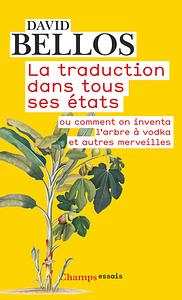Take a photo of a barcode or cover
I learned some interesting things about language from this book, but reading it was a slog. It is not nearly as accessible as the title would seem to suggest, and I frequently got the impression that the author is someone who knows so much about his field at such a cerebral level that he's lost the ability to explain it clearly at a more basic level.
funny
informative
inspiring
relaxing
Bellos evinces the commendable quality of being always right.
funny
informative
inspiring
lighthearted
reflective
medium-paced
informative
well written and researched by a bit dry and repetitive. this is fine if you're studying translation but not for general reading
slow-paced
Ever since I was conscious that there *were* other languages, I have been fascinated by translation. In this book, veteran translator David Bellos talks about the common problems--how does a translator reproduce or replicate jokes, loanwords, slang, dialect, race or class markers? Should a translator strive for precise accuracy or getting across the sense of the words to a new audience? Are translations bound to preserve the original form of the text (poetry, for example) or may they be made more accessible? With many examples and special focus on the fraught worlds of translating the Bible, laws and diplomatic treaties, Bellos also suggests that the translations on which we rely are getting both more universal (google translate) for basic general use and more difficult to staff (a serious problem finding high-level multi-lingual staff for UN simultaneous translations, or court interpreters, for example) for matters in which precise word use can have serious consequences.
Another pandemic re-read. This isn't so much of a book as a series of essays masquerading as chapters. It also runs out of steam towards the end, with chapters getting shorter. That said, it's an interesting overview of translation and why it matters.
My favorite chapter was the one on how the EU manages all the translations even though they aren't really translations. The chapter on machine translation is dated. That isn't the author's fault, as we've made large leaps with that in the less than ten years since the book was published.
Overall, I think it's a nice book that anyone interested in translation would like. Oh, yeah, and the Douglas Adams reference is nice...
My favorite chapter was the one on how the EU manages all the translations even though they aren't really translations. The chapter on machine translation is dated. That isn't the author's fault, as we've made large leaps with that in the less than ten years since the book was published.
Overall, I think it's a nice book that anyone interested in translation would like. Oh, yeah, and the Douglas Adams reference is nice...
Highly entertaining read through various facets of translation and translation philosophy. The book has the right balance between anecdote and analysis to keep the lay reader engaged. One of the highlights in the book comes right at the end in the epilogue with a reassessment of the reason behind language.
Bellos has translated Perec, including Life A Users Manual which I started reading 20 years ago, but never got through the first quarter. He uses Perec a lot in his examples and I'm sorely tempted to return to Life A Users Manual in 2014....
He also references Hofstadter's Ton Beau de Marot a lot, which I also really enjoyed.
Bellos has translated Perec, including Life A Users Manual which I started reading 20 years ago, but never got through the first quarter. He uses Perec a lot in his examples and I'm sorely tempted to return to Life A Users Manual in 2014....
He also references Hofstadter's Ton Beau de Marot a lot, which I also really enjoyed.
I was hesitant to rate this as well as hesitant to write a review, but here we are. As a translator in the making I was asked to read this book. And although it wasn't entirely bad, and the author's writing style is quite pleasant, the content was disappointing. It had interesting cases, showing how diverse translation is and that it happens everywhere, but every time there was a point to be made, there is a huge unnecessary digression before actually making or stating the point of a chapter.
If you are interested to read more on translation or interpreting I suggest reading "Found in Translation" because it has the same idea, only a better execution.
If you are interested to read more on translation or interpreting I suggest reading "Found in Translation" because it has the same idea, only a better execution.





